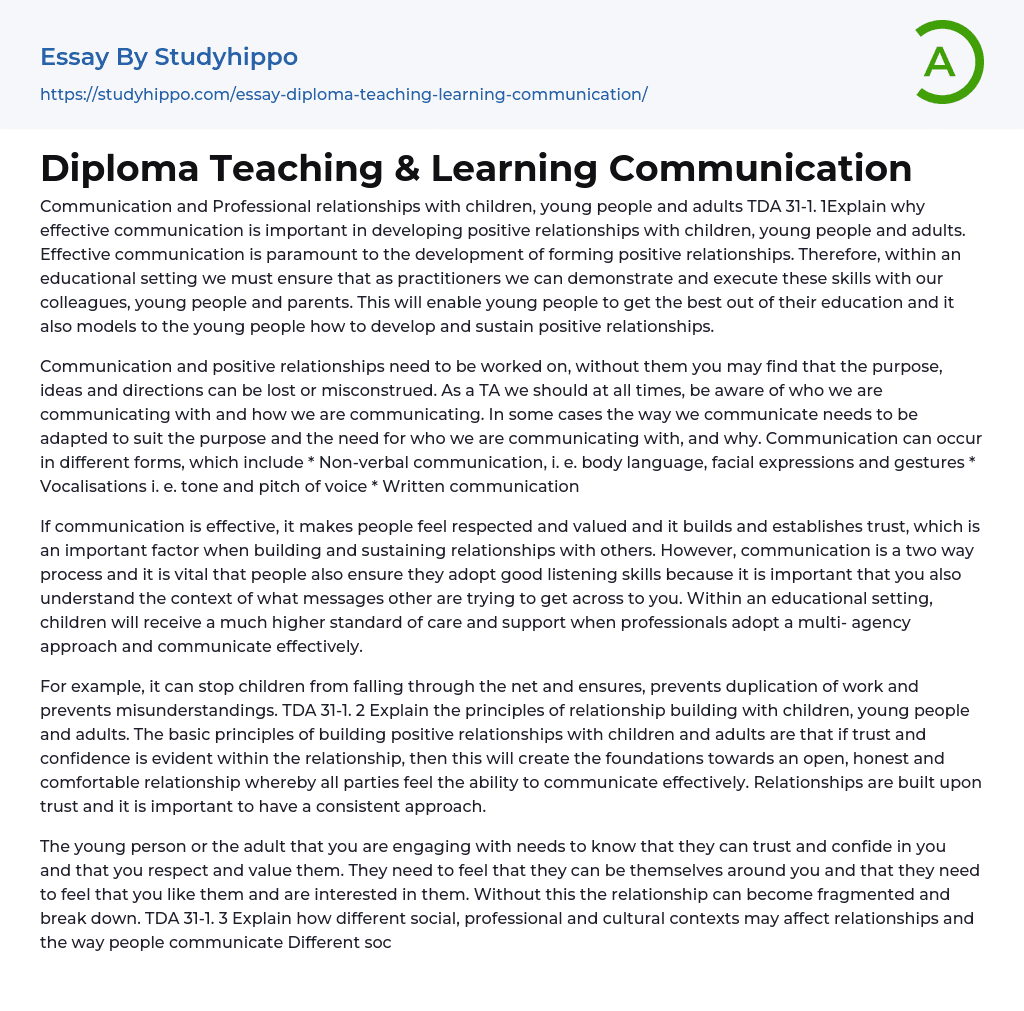Effective communication is crucial in an educational setting for developing positive relationships with children, young people, and adults. It is essential to demonstrate and execute these skills when interacting with colleagues, young people, and parents. This allows young people to maximize their education and learn how to establish and maintain positive relationships.
Effort is necessary to maintain effective communication and positive relationships, as neglecting effort can lead to loss or misunderstanding of intended purposes, ideas, and directions. As a TA, it's important to consider both the recipients of our communication and the method used for communication. Adjusting communication style based on the situation may be required in order to meet specific needs and goals. Communication can manifest through non-verbal cues (body language, facial expressions, gestures), vocalizations (tone and pitch of voice), and written messages.
tify">
The significance of effective communication lies in its promotion of respect, valuing individuals, and fostering trust, which are crucial for maintaining relationships. Equally important is the skill of active listening and comprehending the messages communicated by others. In an educational environment, children greatly benefit from professionals who employ a multi-agency approach and communicate effectively, leading to improved care and support.
To illustrate, it can prevent children from slipping through the cracks and also avoids duplicated efforts and misunderstandings. TDA 31-1.2 Explain the principles of building relationships with children, young people, and adults. The basic principles of establishing positive relationships with children and adults are that trust and confidence in the relationship establish a foundation for an open, honest, and comfortable relationship where all parties can communicate effectively. Trust is the cornerstone of relationships and maintaining a
consistent approach is crucial.
When interacting with both young people and adults, it is crucial to value trust, confidence, respect, and the importance of feeling at ease. It is essential for them to genuinely believe that you care about them. Failing to establish these foundations can result in a strained and deteriorating relationship. TDA 31-1.3 explores how relationships and communication between individuals can be influenced by different social, professional, and cultural contexts.
In terms of relationships, my interactions with parents and students differ. My communication style also varies depending on the individual I am speaking to. For example, when talking to a child or young person, I adopt a less formal tone compared to when conversing with a parent. Additionally, when engaging with a child or young person, I may combine visual aids and verbal communication.
It is important to cater to the specific needs of parents who do not speak English as their first language when sending letters about parent-teacher meetings or school event invitations. This can affect their relationship with the school. Face-to-face meetings may be more effective than phone calls because they allow for better understanding through facial expressions and hand gestures.
It is essential to comprehend and adjust communication methods based on cultural and social aspects. What may be deemed acceptable in one culture may not be so in another, thus it is crucial to consider this while communicating. Moreover, the individual's societal background should also be considered when interacting with them. For instance, when conversing with parents, it is vital to establish a friendly and welcoming tone as they may feel scared or criticized.
- Child essays
- Child labor essays
- Childcare essays
- Gesture essays
- Communication Skills essays
- Cross-Cultural Communication essays
- Effective Communication essays
- Greeting essays
- Intercultural Communication essays
- Interpersonal Communication essays
- Nonverbal Communication essays
- Orality essays
- Coaching essays
- Critical Thinking essays
- homework essays
- Learning essays
- Library essays
- Listening essays
- Literacy essays
- Mentor essays
- Physical Education essays
- Project essays
- Reading essays
- Research essays
- Sex Education essays
- Social Studies essays
- Standardized Testing essays
- Study Plan essays
- Teaching essays




